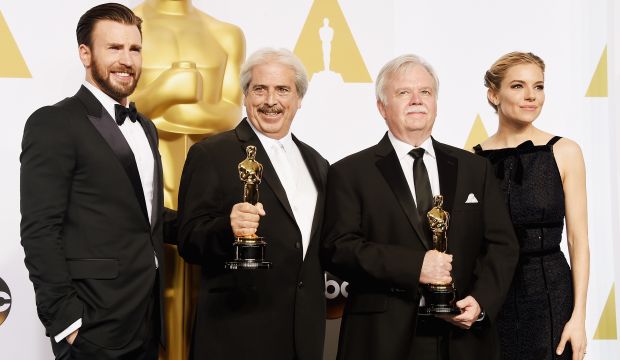Let us compare the following two scenes.
The first is a famous scene from the recent Hollywood movie, American Sniper, in which we are shown a point-of-view shot from the lead character, US Navy SEAL Chris Kyle, played by Bradley Cooper. In the scene, Kyle—who with 160 confirmed kills during his four tours of Iraq is the most prolific sniper in US military history—is watching a mother and her young son carefully through the scope of his sniper rifle while perched atop a building in Baghdad. The scene ends with Kyle shooting both mother and son, believing they were attempting to detonate a bomb. What is remarkable about the scene is that the way it is shot and presented to the viewer succeeds in portraying the mother and child as “the bad guys,” to use the Hollywood parlance, with Kyle, the “good guy,” merely engaging in an act of self-defense—and, on a broader scale, one committed to the defense of his homeland.
The second scene I want to look at is more recent, and can be split into two halves. The first half involves a famous actor kneeling to kiss a Syrian soldier’s boot; the second involves a famous anchorwoman, also kissing a Syrian soldier’s boot—which she had obtained from the soldier in question when she earlier visited Damascus—live in a studio on a pro-Assad television channel. Both these scenes symbolize an alarming act of patriotism and support for the Syrian army, which in full view of everyone in the world kills thousands of its own people under the pretense of confronting Syria’s enemies and protecting the country from an insidious arch-conspiracy.
While it is true there is a big difference between the American and Syrian cases here, the comparison between the two scenes is meant to highlight a real crisis we all face in this day and age of widespread conflict and killing. By this I mean the blind enthrallment we see around the world today toward armed forces, along with the belief that the soldier carrying out his military duties is also somehow involved in some kind of sacred mission, that he belongs to an unconquerable force—that he has the right to kill certain people who seem to belong to the “other,” no matter what their circumstances.
There is currently an ongoing fascination with this in the United States, accompanied by a malignant kind of marketing campaign trumpeting a “patriotic” use of force, especially in films and in the media. Every day we see these images coming out of the US, in advertisements, movies, even in songs, presenting us with the image of the soldier as an unstoppable force, and an attractive, desirable one to boot. Much has been written in opinion pieces and research papers about the role the US Department of Defense plays here, especially when it comes to Hollywood films. It is a relationship from which both Hollywood and the Pentagon mutually benefit: movie directors and producers are provided with realistic extras, locations, and equipment by the army, while the Pentagon benefits from the millions of dollars which Hollywood pays to use them.
This relationship has helped Hollywood create and define the image of the American soldier as “the good guy.” American Sniper, which garnered millions at the box office, is the latest in a long string of movies which celebrate this image, and, being based on the true story of a soldier who at one time boasted of killing what he said was more than 250 people, perhaps counts as its apotheosis. “Boot kissing,” a literal example of which we saw in the above Syrian scene, is not therefore solely an Arab phenomenon, but a global epidemic. We see it in American right-wing politics, most notably through figures like former Alaska governor and 2008 vice-presidential candidate Sarah Palin, who publicly praised American Sniper, pouring her derision on those “Hollywood leftists,” as she put it, who had criticized the film, claiming they were “not fit to shine Chris Kyle’s combat boots.” The reaction to the film has certainly put the scope on the highly polarized and divided attitudes Americans have toward their armed forces. The film promotes military and nationalist values as well as state violence, presenting them in a positive, attractive light. It was this growing “right-wing turn” in US movies that so irked, and disturbed, those in Hollywood’s leftist and liberal circles when it came to American Sniper.
In order to understand this phenomenon in the US, we need to bear in mind that only 0.5 percent of the American population serve in the armed forces—compared to the era of the Second World War, when more than 12 percent of Americans wore army boots, so to speak. This is what drives the Right’s encroachment on Hollywood. For while US conservatives are enamored with all things military, there are also widespread debates in the country regarding the army’s role and the blind patriotism that exonerates many actions committed by the US and its soldiers abroad.
In the Arab case, the sight of two prominent people, an actor and a television presenter, kissing army boots was a cringe-worthy scene of utter debasement and weakness. But we reacted by merely lampooning and laughing at these figures. For even though it would be difficult to find a positive reaction to such actions, even among those who share these two boot-kissers’ convictions, praise for the military among media practitioners has now become the norm in many parts of the Arab world.
Hollywood may portray an attractive image of the soldier and present killing as a virtue, but for us in the Arab world it is enough that someone kisses an army boot to show they love their country—though, in reality, it is nothing but a porcelain, superficial nationalism.
